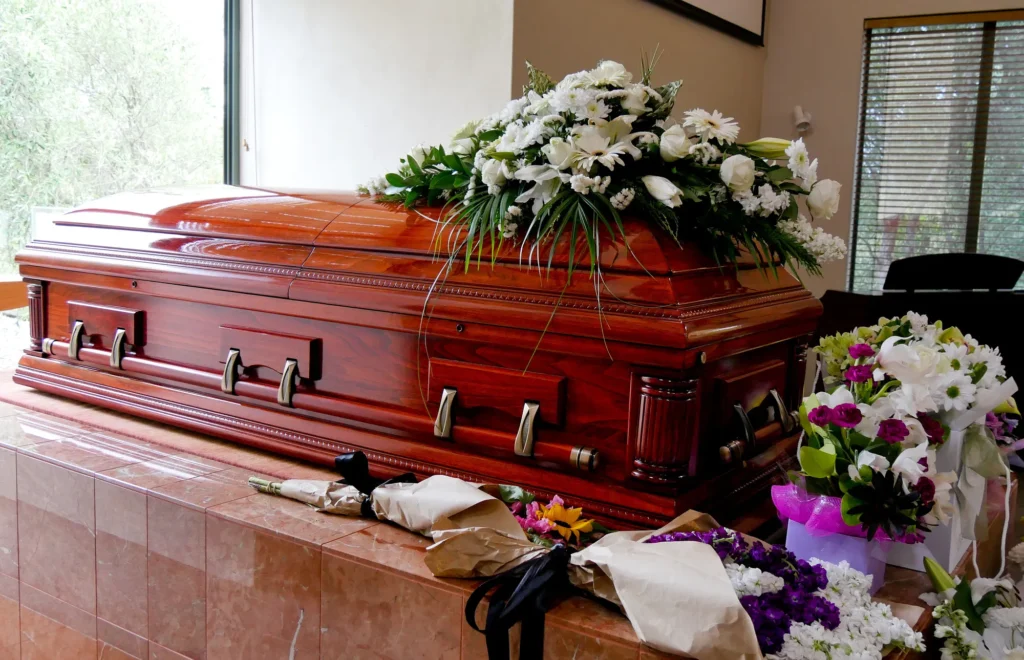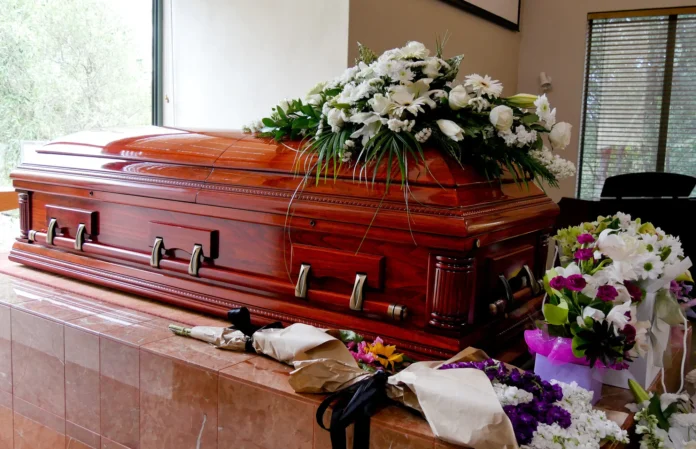
Funerals in Ghana have long been solemn rites of passage, a deeply spiritual ceremony to honour the dead and guide their souls to the ancestral realm.
But today, that dignity is under threat. Viral videos now show young people turning corpses into props for entertainment: lifting and spinning them, dancing with them, and posing for social media.
In some of these videos, a group of young men identified as galamsey workers bid farewell to a friend by mimicking their gold-washing routine with his corpse.
In Asante Akyem Akutuase, mourners marched a dead body around the funeral grounds like a trophy. In another video, the corpse of a chop bar operator is dressed to mimic preparing and serving a meal, fufu as though she were alive and serving customers.
In another instance, a corpse is seated behind the steering wheel of a taxi and driven around the funeral grounds. These are just a few examples; many more circulate daily on platforms like TikTok.
What was once sacred is mutating into spectacle. What should be a space for mourning and reflection has become a chaotic blend of cultural distortion, digital sensationalism, and dangerous public health ignorance.
This article is a call to action: legal, cultural, and policy-based to stop this disturbing trend before it becomes a full-blown crisis.
Mishandling Corpses: A Hidden Public Health and Cultural Crises
Dead bodies are not inert. According to the International Society for Infectious Diseases, corpses can carry deadly pathogens such as Mycobacterium tuberculosis, Hepatitis B, and Clostridium species.
When handled without protective gear, these pathogens can spread through open wounds, inhalation, or contaminated food and surfaces.
The World Health Organization echoes this concern, noting that corpses can become sources of infection when death results from communicable diseases such as cholera, viral haemorrhagic fever, or influenza.
In such cases, contact with bodily fluids, tissues, or contaminated clothing can facilitate disease transmission.
Beyond the health risks, the trend of mishandling corpses also represents a profound cultural crisis.
In Ghanaian tradition, funerals are more than ceremonial gatherings; they are sacred transitions, marking the journey of the soul to the ancestral realm. Yet this sacred meaning is increasingly undermined by the very generation expected to uphold it.
Nana Adusei Atwenewa Ampem I, the Omanhene of Tepa in the Ashanti Region, has publicly condemned the growing practice of youth parading, dancing with, or carelessly handling corpses during funerals, warning of grave spiritual consequences.
He described such acts as a desecration of the body, which in Ghanaian belief is inherently sacred. These behaviours, he cautioned, reflect a troubling disconnection between younger generations and the long-standing cultural values that demand dignity for the dead.
Within many Ghanaian communities, funeral rites are not mere social occasions but solemn spiritual passages, and violations of these customs are believed to invite misfortune and disrupt communal harmony.
Laws on the Books, Silence in the Streets
The Public Health Act, 2012 (Act 851) contains comprehensive provisions aimed at ensuring the safe and dignified handling of human remains as a measure to protect public health.
It empowers health authorities to regulate the disposal of bodies, particularly in situations where improper handling could spread disease. The Act expressly prohibits the mishandling of corpses and mandates that burials and funerals be conducted in a manner that safeguards community health.
It further authorizes health officers to intervene when a corpse is being kept, transported, or displayed under conditions likely to endanger health, including the removal, isolation, or controlled burial of bodies in the event of a public health risk.
Despite these clear legal safeguards, enforcement remains weak. Incidents of youth mishandling corpses during funerals, lifting, dancing with, or unnecessarily exposing them in public persist in open violation of the Act’s intent to protect both public health and societal decency.
This disconnect between legislation and practice reflects inadequate monitoring, low public awareness, and limited institutional intervention.
Recommendations: A Multi-Sectoral Call to Action
Addressing the disturbing trend of youth mishandling corpses at funerals in Ghana requires a coordinated, multi-sectoral response.
First, Public Health Act, 2012 (Act 851) must be enforced in full. Environmental and health officers should ensure burial hygiene regulations are upheld, while local assemblies enact and apply by-laws that ban unsafe public displays of corpses.
This legal enforcement should be complemented by a sustained national public education campaign, jointly led by the Ministries of Health, Information, and Local Government. Schools, churches, mosques, and the media must become central partners in shaping public attitudes toward funerals, reinforcing both health and cultural values.
Given the growing role of social media in amplifying these practices, the National Media Commission and the Cybersecurity Authority should collaborate with platforms such as TikTok and Facebook to identify, flag, and remove harmful funeral-related videos.
Social media companies must also be held accountable for enabling the spread of such content.
Additionally, the “funeral services sector” itself requires reform: undertakers, community organizers, and related service providers should undergo certified training in infection prevention and culturally respectful practices.
Finally, traditional authorities must reclaim their role as custodians of funeral customs, restoring the sacredness of these rites and firmly discouraging desecration in all its forms.
Only through such a united approach can Ghana protect public health, preserve cultural dignity, and guide its youth away from turning funerals into spectacles.
Conclusion: Honour Must Accompany Every Farewell
Ghanaian funerals have long been sacred spaces: moments of reflection, unity, and deep respect for the departed. Yet, if the current trend continues, these solemn rites risk being reduced to shameful spectacles. The dead deserve our reverence, not our ridicule.
The living deserve the comfort of safe, respectful mourning, not the risk of disease or the pain of seeing a loved one treated without honour.
Now is the time to act. We must reclaim the values that have guided our mourning traditions for generations, before they are buried beneath the fleeting applause of viral videos and the emptiness of online trends. Funerals are not stages, and corpses are not props. Every act of disrespect is a scar upon our culture and a danger to our health.
If death is to be our final act, let it be one marked by honour, compassion, and cultural pride, not by the careless gestures that shame both the living and the dead.
About the Author
Elvis Opoku Agyemang is a culturally conscious advocate with a Bachelor of Arts in Akan Language and Culture from the Kwame Nkrumah University of Science and Technology (KNUST). He blends traditional wisdom with modern insights to champion cultural preservation, education, and youth empowerment. His mission is to safeguard Ghana’s heritage while promoting community development and national pride. He can be reached at opokuagyemangelvis878@gmail.com.
DISCLAIMER: The Views, Comments, Opinions, Contributions and Statements made by Readers and Contributors on this platform do not necessarily represent the views or policy of Multimedia Group Limited.
DISCLAIMER: The Views, Comments, Opinions, Contributions and Statements made by Readers and Contributors on this platform do not necessarily represent the views or policy of Multimedia Group Limited.


